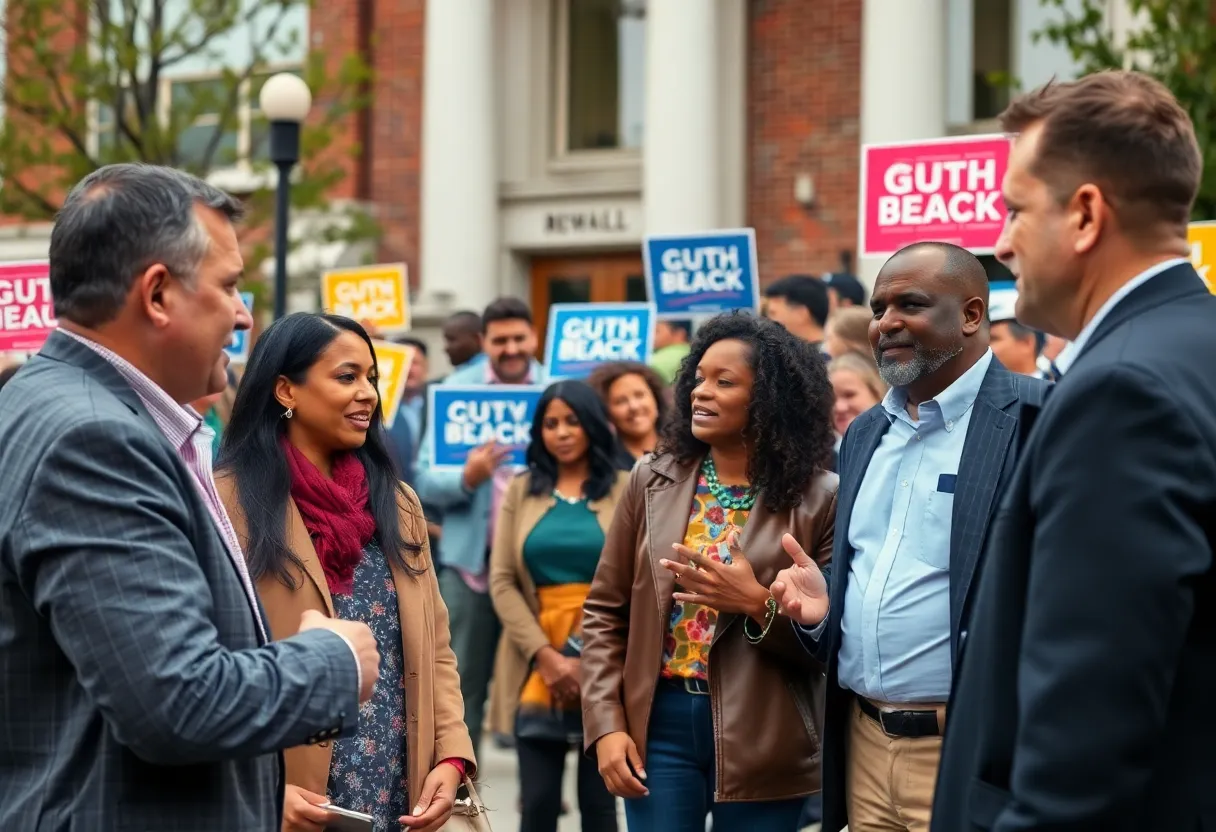Boston, August 25, 2025
News Summary
In the lead-up to the preliminary mayoral election in Boston, Mayor Michelle Wu holds a significant lead over challenger Josh Kraft, with about a 30-point gap in polling. The campaign has intensified, focusing on key issues like sanctuary city policies, tax reforms, and city economic performance. While Wu defends her stance on undocumented resident protections, Kraft faces scrutiny over his campaign finances. As the election date approaches, both candidates navigate complex economic concerns and policy disputes that could influence voter behavior.
Boston — Mayor Michelle Wu holds a commanding lead over challenger Josh Kraft as the preliminary mayoral election approaches on September 9, with polls showing Wu ahead by roughly 30 percentage points and only a small share of undecided voters. The race has intensified with sharp exchanges over sanctuary city policies, campaign spending and city economic performance.
Key developments
The most immediate facts shaping the race are the polling gap, campaign finances and policy clashes. Mayor Wu has defended Boston’s sanctuary policies that protect undocumented residents, framing the stance as consistent with civic values and resisting federal pressure. Her campaign enjoys notable endorsements and added consultant support, while Kraft has spent heavily but trails in voter preference.
Kraft has invested millions of dollars in his campaign yet reportedly has about $150,000 in cash remaining, suggesting a likely need for personal financing if he hopes to close the gap. Wu’s campaign has publicly criticized Kraft’s business dealings and fundraising practices and has taken steps to report those matters to state regulators. Kraft’s team contests that scrutiny and positions him as a seasoned nonprofit leader focused on solving city issues.
Economic and policy battlegrounds
Economic performance and tax policy are central points of contention. Massachusetts lost an estimated 17,000 jobs last year, a result opponents attribute in part to policies enacted by Mayor Wu and Governor Maura Healey. State rankings cited in campaign discussions show Massachusetts ranked #5 in education but lagging in job creation, #41 for opportunity and #39 in infrastructure, while ranking #1 for welfare benefits. Critics argue high tax levels may be driving graduates and entrepreneurs away, undermining job growth.
Tax policy is a specific flashpoint: Wu has proposed shifting more of the city’s tax burden onto businesses to provide relief for homeowners. Kraft opposes that plan, arguing for greater fiscal discipline and warning that the Wu administration has not been transparent about potential residential tax increases. The Wu campaign counters that Kraft’s opposition could leave homeowners exposed to higher residential taxes and highlights his family wealth as evidence of distance from typical voter concerns.
Campaign dynamics and messaging
The campaign has been marked by reciprocal attacks. Kraft emphasizes his nonprofit leadership background and seeks to redirect focus to municipal challenges, including affordable housing and neighborhoods affected by the opioid crisis. His aides express confidence that closer voter attention could narrow the margin. Political analysts, however, caution that large campaign expenditures alone may not change firmly held public perceptions that shape voter choices.
Mayor Wu’s political operation has consolidated support through endorsements from prominent figures and by adding outside consultants, which supporters say has strengthened her strategic position. Recent polls show a sustained favorability advantage for Wu despite the city’s economic and social challenges.
Legal and regulatory actions
Beyond public debate, the campaign has spilled into regulatory channels. The Wu campaign has reported aspects of Kraft’s business and fundraising to state authorities, while Kraft frames that scrutiny as part of a broader political strategy to undermine his candidacy. These filings add a formal dimension to an already contentious contest.
Election timing and outlook
The preliminary election on September 9 will winnow the field and set the stage for a final vote. With Wu holding a substantial lead in available polls and endorsements from political and civic figures behind her, analysts view her position as strong entering the final months before voters decide. Kraft’s remaining cash on hand and potential need for further financing are focal points for his ability to sustain and expand campaign operations.
Background context
Longstanding policy debates in Boston and Massachusetts — including immigration protections, taxation, infrastructure investment and public services — form the backdrop of the mayoral contest. Statewide rankings on education, opportunity and infrastructure are being used by both campaigns to support competing narratives about where the city and state stand and how leadership choices will shape economic opportunity.
What to watch next
- Voter attention and turnout ahead of the September 9 preliminary election.
- Any additional regulatory findings or filings related to campaign finance and business activities.
- Further shifts in campaign cash-on-hand for Kraft and fundraising moves by both campaigns.
- Debates and public forums where tax policy, sanctuary practices and public safety will be tested with voters.
Frequently Asked Questions
When is the preliminary mayoral election in Boston?
The preliminary mayoral election is scheduled for September 9.
How large is the polling gap between Michelle Wu and Josh Kraft?
Recent polls show Mayor Michelle Wu leading Josh Kraft by about 30 percentage points, with few undecided voters.
How much money does Josh Kraft have left in his campaign account?
Kraft has reportedly spent millions on the campaign and has about $150,000 remaining in campaign funds.
What are the main issues dividing the candidates?
Key issues include sanctuary city policies, tax proposals that shift the burden toward businesses, affordable housing, the opioid crisis, and city economic performance.
What economic concerns are being raised in the race?
Critics point to a reported loss of roughly 17,000 jobs in Massachusetts last year and cite state rankings that show strong education outcomes but weaker performance in job creation, opportunity, and infrastructure.
Quick reference table
| Item | Detail |
|---|---|
| Preliminary election date | September 9 |
| Poll gap | Wu leads by ~30 percentage points |
| Kraft campaign cash on hand | Approximately $150,000 |
| Estimated job losses in Massachusetts last year | About 17,000 jobs |
| State rankings cited | Education #5; Opportunity #41; Infrastructure #39; Welfare benefits #1 |
| Major policy disputes | Sanctuary policies, business vs. residential tax burden, affordable housing, opioid response |
| Notable campaign actions | Endorsements for Wu; regulatory complaints filed regarding Kraft’s business/fundraising |
Deeper Dive: News & Info About This Topic
HERE Resources
Boston Officials Clash with Federal Authorities Over Sanctuary Policies
Concerns Over AI’s Impact on Humanities Education
Robert Kraft Defends Son Josh Kraft’s Mayoral Candidacy
Boston Mayoral Election 2025: Candidates and Key Issues
Boston City Council Tensions Rise Over Transparency Issues
Boston to Uphold Sanctuary Policies Despite Federal Pressure
Boston Mayor Stands Firm on Sanctuary Policies Amid Federal Pressure
Mayor Michelle Wu Defends Boston’s Sanctuary City Policies Amid Migrant Arrests
Boston Mayor Defends Sanctuary Policies Amid DOJ Deadline
Will Onuoha Promises Transformative Housing and Education Solutions
Additional Resources
- Boston Globe: Boston Mayor’s Race
- Wikipedia: Michelle Wu
- Boston Herald: Josh Kraft and Michelle Wu Exchange Jabs
- Google Search: Boston Mayoral Election 2025
- Fox News: Wu Fires Back Over Sanctuary City Policies
- Encyclopedia Britannica: Boston
- NBC News: ICE Director Comments on Boston Mayor
- The Guardian: Boston’s Sanctuary City Policies
- Boston Globe: Wu Responds to Bondi

Author: STAFF HERE BOSTON WRITER
The BOSTON STAFF WRITER represents the experienced team at HEREBoston.com, your go-to source for actionable local news and information in Boston, Suffolk County, and beyond. Specializing in "news you can use," we cover essential topics like product reviews for personal and business needs, local business directories, politics, real estate trends, neighborhood insights, and state news affecting the area—with deep expertise drawn from years of dedicated reporting and strong community input, including local press releases and business updates. We deliver top reporting on high-value events such as Boston Marathon, Head of the Charles Regatta, and Boston Harborfest. Our coverage extends to key organizations like the Greater Boston Chamber of Commerce and Associated Industries of Massachusetts, plus leading businesses in finance, biotech, and insurance that power the local economy such as Fidelity Investments, Biogen, and Liberty Mutual Insurance. As part of the broader HERE network, we provide comprehensive, credible insights into Massachusetts's dynamic landscape.





